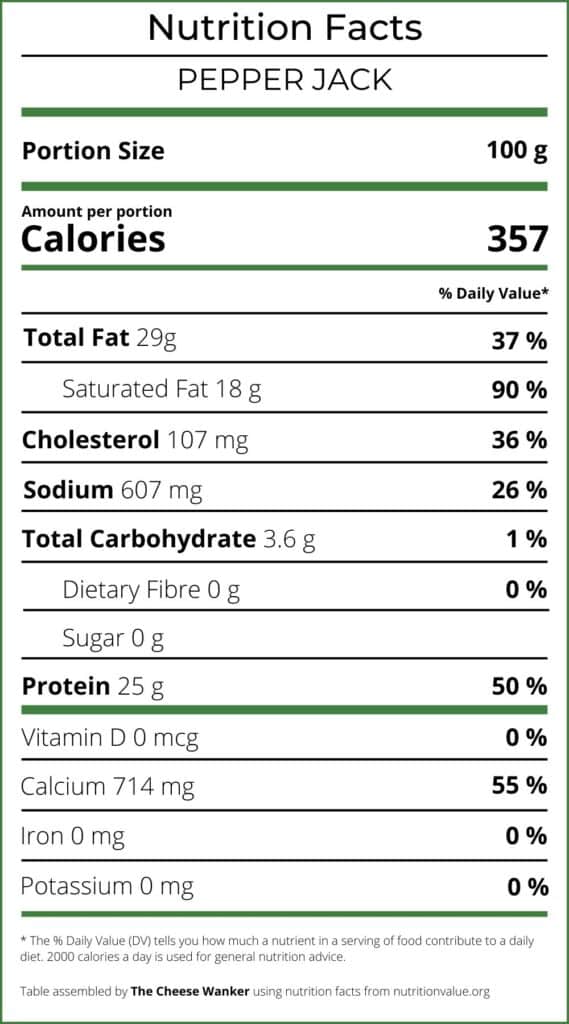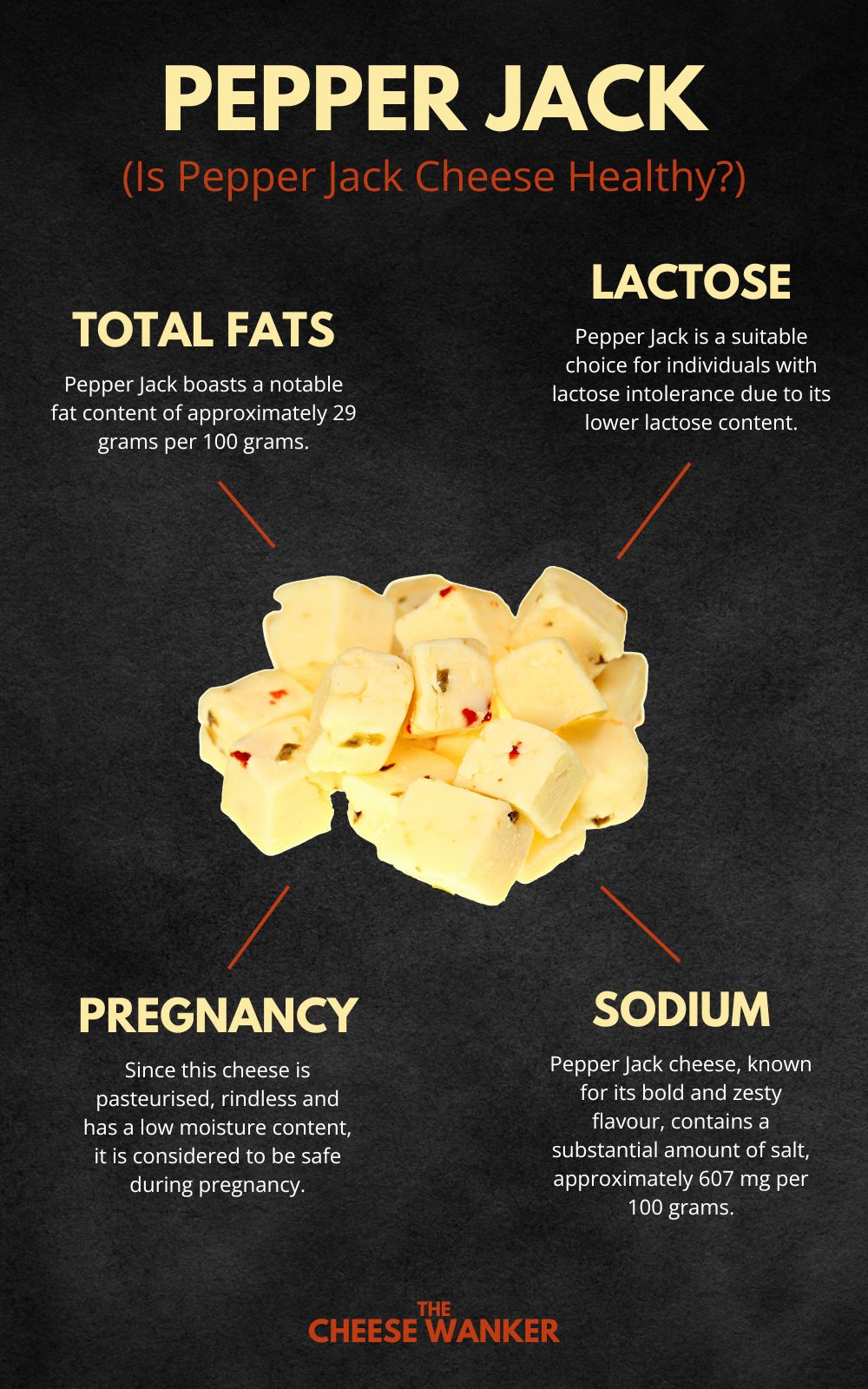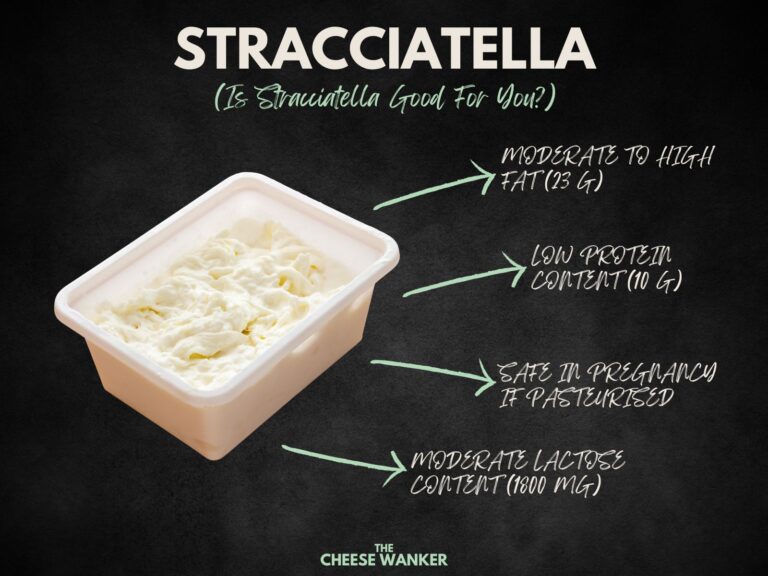Pepper Jack cheese is a delectable and zesty variety of cheese that has captured the taste buds of many. But beyond its tantalising flavour, it is essential to understand the nutritional composition of this cheese to make informed dietary choices. In this blog post, we delve into the nutrition facts of Pepper Jack.

SEE ALSO: Nutrition facts for popular world cheeses in The Cheese Wanker’s index →
What is Pepper Jack?
Pepper Jack, born in the United States as a variation of Monterey Jack, boasts a distinctive character that sets it apart. Its origins can be traced to California, where it emerged within Mexican-American communities. This popular flavoured cheese blends the creamy base of Monterey Jack with the fiery kick of peppers.
The name “Pepper Jack” perfectly encapsulates its essence, with “Pepper” representing its spicy edge and “Jack” acknowledging its Monterey Jack roots. This fusion of mild creaminess with a peppery zing defines the essence of Pepper Jack cheese.
In terms of sensory qualities, Pepper Jack cheese is a symphony of flavours, textures and colours. Its taste profile highlights a gentle, yet noticeable spiciness derived from the incorporation of jalapeño peppers.
When it comes to serving, Pepper Jack cheese offers versatile possibilities. It pairs effortlessly with an array of accompaniments, including crackers, artisan bread and fruits like apples and grapes.
Moreover, its melting properties make it ideal for dishes like Quesadillas and Macaroni & Cheese. Having said that, Pepper Jack also shines in salads, sandwiches and creamy dips.
Nutrition fact sheet

Country of origin
United States of America
Type of Cheese
Milk
Cow
Examples
Petaluma Creamery Firehouse Pepper Jack, Sargento Sliced Pepper Jack, Jalapeño Pepper Jack
Benefits
Low Lactose, High Protein Content, Safe in Pregnancy, High Calcium Content
Considerations
Milk Protein Intolerance, High Fat Content, Moderate Cholesterol Content, Moderate Salt Content
Nutritional review for Pepper Jack
Eating healthy plays a pivotal role in maintaining overall well-being and preventing chronic diseases. A balanced and nutritious diet provides our bodies with essential vitamins, minerals and macronutrients.
With this in mind, let’s have a look at some of the key nutrition facts for Pepper Jack.
Lactose Intolerance
Pepper Jack cheese is a suitable choice for individuals with lactose intolerance due to its lower lactose content. This cheese, like other aged cheeses, undergoes fermentation during production, which significantly reduces lactose levels.
As a result, most lactose-intolerant people can tolerate Pepper Jack cheese. However, individual tolerance can vary, so it’s advisable to start with small servings. And consider lactase supplements or lactose-free alternatives for those with more severe lactose intolerance.
Overall, Pepper Jack cheese stands out as a delicious and relatively lactose-friendly addition to various dishes.
Fat Content
Furthermore, Pepper Jack cheese boasts a notable fat content of approximately 29 grams per 100 grams. It’s essential to examine the implications of this fat content and its relevance to dietary choices.
While Pepper Jack cheese is rich in fat, it’s important to understand that not all fats are created equal. The predominant fats in this cheese are saturated and monounsaturated fats.
Saturated fats, when consumed in excess, have been linked to an increased risk of heart disease and other health issues. Therefore, moderation is key when indulging in Pepper Jack cheese to maintain a heart-healthy diet.
However, not all fats are necessarily harmful. Monounsaturated fats, found in foods like avocados and olive oil, are considered heart-healthy fats that can help improve cholesterol levels when consumed in moderation. In Pepper Jack cheese, these fats contribute to its creamy texture and enhance its overall flavour profile.
To make the most of Pepper Jack cheese, consider enjoying it in moderation and balancing it with other heart-healthy food choices.
You can learn more about the different types of fat in cheese and which cheeses have the lowest fat content here.
Cholesterol Content
Pepper Jack cheese contains approximately 107 mg of cholesterol per 100 grams, which prompts us to explore the significance of this dietary cholesterol and its impact on our health.
Dietary cholesterol has long been a topic of concern in nutrition, with previous recommendations suggesting a strict limitation on its intake due to concerns about its influence on blood cholesterol levels.
However, scientific understanding has evolved, revealing a more nuanced relationship between dietary cholesterol and health.
Indeed, recent research indicates that for most individuals, dietary cholesterol, such as that found in Pepper Jack cheese, has a relatively modest impact on blood cholesterol levels. The body regulates cholesterol production, and dietary intake of cholesterol accounts for only a portion of the cholesterol in our bloodstream.
Consequently, the cholesterol in Pepper Jack cheese may have a limited effect on overall cholesterol levels for many people.
It’s essential to note that individual responses to dietary cholesterol can vary, and some individuals may be more sensitive to its effects. Therefore, those with specific health concerns or conditions should consult with a healthcare professional to determine the most appropriate dietary choices.
Protein Content
Next, let’s take a look at one of the most important macronutrients, proteins. As a matter of fact, Pepper Jack is a noteworthy source of protein, boasting an impressive 25 grams of protein per 100 grams. Understanding the type and importance of protein in Pepper Jack cheese sheds light on its nutritional value and potential health benefits.
The primary type of protein found in Pepper Jack cheese is casein, a high-quality protein that offers a full complement of essential amino acids. Casein is a slow-digesting protein, providing a sustained release of amino acids into the bloodstream, which can be particularly beneficial for muscle repair and growth during periods of rest, such as overnight.
Protein is a vital macronutrient essential for various physiological processes in the body. It plays a fundamental role in building and repairing tissues, supporting the immune system, and serving as a source of energy when carbohydrates are limited.
Furthermore, the amino acids derived from protein are the building blocks of enzymes, hormones and various structural components in the body.
Incorporating Pepper Jack into your diet can be a great way to increase your protein intake. Whether you enjoy it on its own or as an ingredient in various dishes, the protein content in Pepper Jack cheese contributes to its nutritional value, making it a valuable addition to a balanced diet.
Want to find out which cheeses have the highest protein content? Click here for our blog post covering cheeses with the highest protein content.
Safety in Pregnancy
Pepper Jack is considered a safe option for consumption during pregnancy. And it offers several characteristics that make it a reliable choice for expectant mothers.
One of the key safety factors of Pepper Jack is that it is typically made from pasteurised milk. Pasteurisation is a process that involves heating the milk to a specific temperature to kill harmful bacteria and pathogens.
This crucial step ensures that potential contaminants, such as Listeria or E. coli, are eliminated. Hence, pasteurisation may reduce the risk of foodborne illnesses that can be especially concerning during pregnancy.
Additionally, Pepper Jack cheese is often characterised by its low moisture content and lack of a rind. These characteristics are beneficial for pregnancy safety. Low moisture content inhibits the growth of bacteria, making the cheese less susceptible to contamination.
The absence of a rind further reduces the risk of exposure to any potential pathogens that might be present on the outer surface of the cheese.
Overall, Pepper Jack cheese can be safely enjoyed during pregnancy when obtained from reputable sources and stored and handled with proper food safety precautions.
However, as with any dietary choices during pregnancy, it’s advisable to consult with a healthcare professional for personalised recommendations based on your individual needs.
You can read more about which cheeses you can eat when you’re pregnant by clicking here.
Salt Content
Pepper Jack cheese, known for its bold and zesty flavour, contains a substantial amount of salt, approximately 607 mg per 100 grams. To fully grasp the significance of this salt content, it’s essential to consider why this cheese is salty, why excessive salt can be detrimental, and who should be particularly cautious about their salt intake.
The saltiness of Pepper Jack cheese is a defining characteristic that contributes to its unique taste profile. This saltiness is achieved through the addition of salt during the cheesemaking process. Without a doubt, the salt enhances the cheese’s overall flavour and complements its spiciness.
While the salt content makes Pepper Jack cheese an enticing choice for many, it’s crucial to enjoy it in moderation, as excessive salt consumption can have adverse effects on health.
High salt intake is linked to an increased risk of hypertension (high blood pressure), a major risk factor for heart disease and stroke. Furthermore, excessive salt can cause the body to retain water, leading to increased blood volume and pressure within the arteries.
For individuals with hypertension or those at risk of developing it, it is advisable to be cautious about salt intake and consume Pepper Jack cheese in limited amounts.
You can read more about why salt is important in cheesemaking in our comprehensive post here.
Calcium Content
Finally, Pepper Jack is a notable source of dietary calcium, containing approximately 714 mg per 100 grams. Calcium is a crucial mineral essential for maintaining strong bones and teeth, as well as supporting various bodily functions like muscle contraction and nerve transmission.
Pepper Jack cheese’s calcium content originates from its milk base, making it a convenient source of this vital mineral.
This calcium-rich cheese can be particularly beneficial for specific groups of people. This includes children and adolescents during growth, pregnant and lactating women and older adults aiming to maintain bone density.
Incorporating Pepper Jack cheese into one’s diet offers a tasty way to meet calcium requirements and support overall health.
However, as with any dietary choice, it’s advisable to maintain a balanced diet and consult with healthcare professionals to ensure that calcium intake aligns with individual health goals and dietary preferences.
Get The Cheese Wanker’s complete guide to calcium content in cheese in this post here.
Conclusion
In the exploration of Pepper Jack’s nutrition facts, we’ve uncovered a wealth of information about this zesty and beloved cheese variety. So, is Pepper Jack cheese healthy? The answer, as with many foods, lies in moderation and balance.
Pepper Jack offers a spectrum of flavours and textures that tantalise the taste buds, making it a versatile and enjoyable addition to various dishes. Its moderate lactose content renders it a viable option for many with lactose intolerance, while its protein content provides valuable amino acids essential for various bodily functions.
However, Pepper Jack’s relatively high fat, cholesterol and salt content necessitate mindful consumption, particularly for those with specific dietary or health concerns.
Its suitability during pregnancy and its role as a source of calcium for bone health make it a valuable component in diverse diets, but it should be consumed in moderation to maintain overall health.
In essence, Pepper Jack cheese can be a delightful and nutritionally sound choice when integrated sensibly into your diet. Understanding its nutrition facts empowers you to savour its bold and zesty character responsibly while making informed dietary decisions that align with your health and taste preferences.

References
All the advice relating to what cheeses you can eat during pregnancy in this article is based on the recommendations by health authorities in Australia, the UK and the USA. If you are unsure about what you can or cannot eat, please consult your doctor.
Australia – FSANZ
United Kingdom – NHS
United Sates of America – FDA



